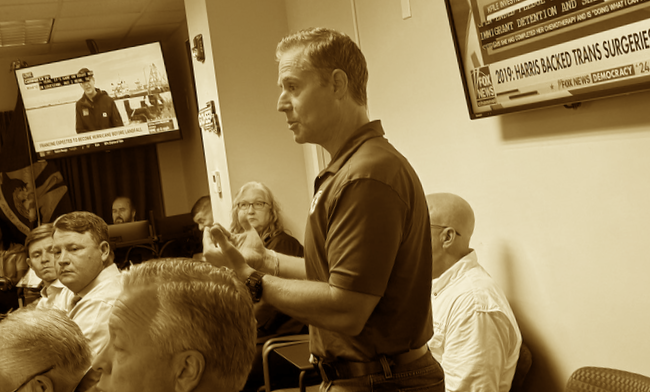INDIANAPOLIS — As a political reporter I have received numerous news tips over the past four decades about rumors involving public servants. Some of them have panned out; others have been devoid of truth.
My threshold for taking such “rumors” to print often comes down to this: Does the situation affect this public servant’s ability to perform the job, to function at high capacity? And is blatant hypocrisy involved?
Two politicians are currently under such scrutiny: Democratic Indianapolis Mayor Joe Hogsett and Republican presidential nominee Donald J. Trump.
The former’s mayoral administration is engulfed in allegations and resignations involving widespread sexual harassment that had been reported and ignored for years. The latter is in apparent cognitive decline to the point that his reality is becoming an abstract concept that most of us cannot understand.
Mirror Indy and IndyStar investigations focused on Thomas Cook, Hogsett’s former chief of staff and past campaign manager, and strongly suggested a toxic culture existed for female employees, almost eight years following the #MeToo movement.
Cook left the administration two years ago, some five years after the first sexual harassment allegations surfaced. Last week another Indianapolis Department of Metropolitan Development employee was terminated after the city’s corporation counsel described “overwhelming evidence” against him. Another five city employees are under similar probes.
The media has been dogging Mayor Hogsett since these allegations surfaced. Before a show by a local comedian on Saturday, Hogsett told the audience: “I want you all … look, I ain’t on the ballot. I ain’t running for nothin’. I’m running from things, but I ain’t running for nothin’. But I want everybody here to make sure you get registered to vote at this election in November.”
On Friday, Hogsett skipped a ribbon cutting at a city animal shelter, sending a female deputy instead to take questions from the media.
Lauren Roberts, a former Hogsett administration employee who has said Cook sexually harassed her, told Fox59/CBS4 that when it came to alerting Hogsett of Cook’s inappropriate behavior, “May of 2017 is when I started emailing the mayor. … The mayor and the city claimed they investigated my report, but I was never interviewed.”
I’ve known Hogsett since 1986 when he managed Evan Bayh’s first statewide campaign. Throughout his legacy as secretary of state, as a congressional and attorney general candidate, as district attorney and finally as mayor, this is the most existential political threat he has faced, even worse than his wife filing for divorce two months before his 2023 reelection.
Democratic strategist Elise Shrock told IndyStar: “When people look at the behavior of the mayor and his top advisors I think they’re wondering where the self-awareness, personal accountability and baseline empathy are. What conditions make them feel that comfortable and so empowered to behave this way? To make jokes in the face of sexual assault?
“… And the void of calls for accountability from many in our party makes for deafening compliance,” Shrock said.
This is a party that has helped place female mayors in the state’s second- and third-largest cities. Now when the party seeks more women to register to vote, the most conspicuous public servant has provided a haven for horndogs.
On Monday, the City-County Council voted 22-1 to launch a wider probe. Now a mere nine months into his third term, the question for Mayor Hogsett is this: Does this mushrooming scandal impair his ability to govern? If he’s skipping events to avoid the media and keeps talking about “running from things,” his days in office will be numbered and his legacy tarnished.
As for Donald Trump, he has spent the past nine years doing and saying things that no other American candidate or officeholder has said and survived. He has become the zombie nominee, surviving and rising in the polls despite indictments, convictions and utter weirdness. It appeared Joe Biden’s win in 2020 drove a stake through Trump’s heart, which was followed by Trump’s coup attempt on Jan. 6, 2021. But after that defeat and congressional losses in 2018 and 2022 that had Trump’s fingerprints all over them, here he is once again with his third GOP presidential nomination.
In the past week, Trump appears to be twisting, twisting, twisting into his own bizarre reality.
Saturday at a MAGA rally in Mosinee, Wisconsin, Trump rambled for nearly two hours. It prompted journalist Heather Cox Richardson to observe on her Substack page: “A number of us who have been watching him closely have been saying for a while that when voters actually saw him in this campaign, they would be shocked at how he has deteriorated, and that seems to be true: his meandering and self-indulgent speeches have had attendees leaving early, some of them bewildered.”
Trump referred to the most conspicuous billionaire (besides himself) as “Leon Musk” (dyslexia?). He forgot the name of the governor of North Dakota (the Doug without the emu who was one of Trump’s veep finalists).
He talked of local school districts performing gender-affirming surgery on children. “Can you imagine you’re a parent and your son leaves the house and you say, ‘Jimmy, I love you so much. Go have a good day at school,’ and your son comes back with a brutal operation?” Trump said. “Can you even imagine this? What the hell is wrong with our country?”
If you don’t want to take my word that this is pure poppycock, go ask your local principal or superintendent how many gender transformations have occurred down at the nurse’s office.
Trump talked of his (and Project 2025) plans to deport some 20 million immigrants (the World War II internment of Japanese Americans in camps numbered around 150,000). “And you know,” Trump said, “getting them out will be a bloody story.”
Say what? What does this mean, dude?
Donald Trump’s world veered into a dystopian nightmare. “If I don’t win Colorado, it will be taken over by migrants, and the governor will be sent fleeing,” he said.
“I will prevent World War III, and I am the only one that can do it. I will prevent World War III. And if I don’t win this election, Israel is doomed. Israel will be gone. I’d better win.”
And this: “I better win or you’re gonna have problems like we’ve never had. We may have no country left. This may be our last election. You want to know the truth? People have said that. This may be our last election. It’ll all be over, and you gotta remember, Trump is always right. I hate to be right. I’m always right.”
Spoken like a stable genius, right?
On the subject of E. Jean Carroll (whom he owes more than $90 million for continually shooting off his mouth despite court orders), Trump said last week: “She said I was making out with her. And then, after 15 minutes — and she changed her story a couple times, maybe it was quicker — then I grabbed her at a certain part and that’s when she had enough,” Trump told reporters as his lawyers looked on. “Think of the practicality of this: I’m famous, I’m in a plane, people are coming into the plane. And I’m looking at a woman, and I grab her and start kissing her and making out with her. What are the chances of that happening?”
Trump added, “And frankly — I know you’re going to say it’s a terrible thing to say — but it couldn’t have happened, it didn’t happen and she would not have been the chosen one. She would not have been the chosen one.”
Eeeeow! That was a terrible thing to say, bro.
On Sunday, he tweeted on his social media platform, Truth Social: “WHEN I WIN, those people that CHEATED will be prosecuted to the fullest extent of the Law, which will include long term prison sentences so that this Depravity of Justice does not happen again. We cannot let our Country further devolve into a Third World Nation, AND WE WON’T! Please beware that this legal exposure extends to Lawyers, Political Operatives, Donors, Illegal Voters, & Corrupt Election Officials. Those involved in unscrupulous behavior will be sought out, caught, and prosecuted at levels, unfortunately, never seen before in our Country.”
And Trump is still channeling “the late, great Hannibal Lecter” (a fictional cannibal) and Al “Scarface” Capone, who was responsible for the St. Valentine’s Day massacre (and the ultimate humiliation of Geraldo Rivera, standing next to that empty vault in Chicago).
Are these two men — Hogsett and Trump — capable of serving in office?
Brian A. Howey is senior writer and columnist for Howey Politics Indiana/State Affairs. Find Howey on Facebook and X @hwypol.






